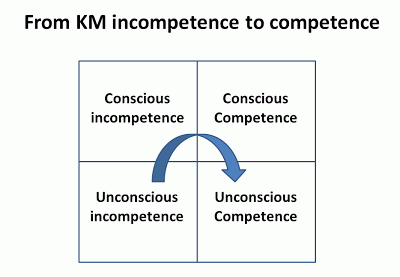Ten PowerPoint Slides on Knowledge Management that Have Influenced Me (Part 2)

To get to Part 1 of this blog post, click here . Do you hate PowerPoint presentations? Well, you probably have endured a lot of gruesome slides throughout the course of your professional life. But despite the usual wisdom that PowerPoint slides for presentations should be avoided whenever possible, I actually think that some well-crafted slides presented in the right context can be a very good thing. In fact, there are a number of slides that had a very positive impact on me in my knowledge management career. I treasure them because they manage to bring complex concepts to the point and often communicate an entire lesson’s worth of insight just with one diagram, graph or image. Here’s a list of ten powerful slides on knowledge management that have influenced me, which I am posting in two parts ( for Part 1 click here ). See for yourself whether you can get some inspiration from them. 6. The Innovation Adoption Curve The innovation adoption curve by sociol...

